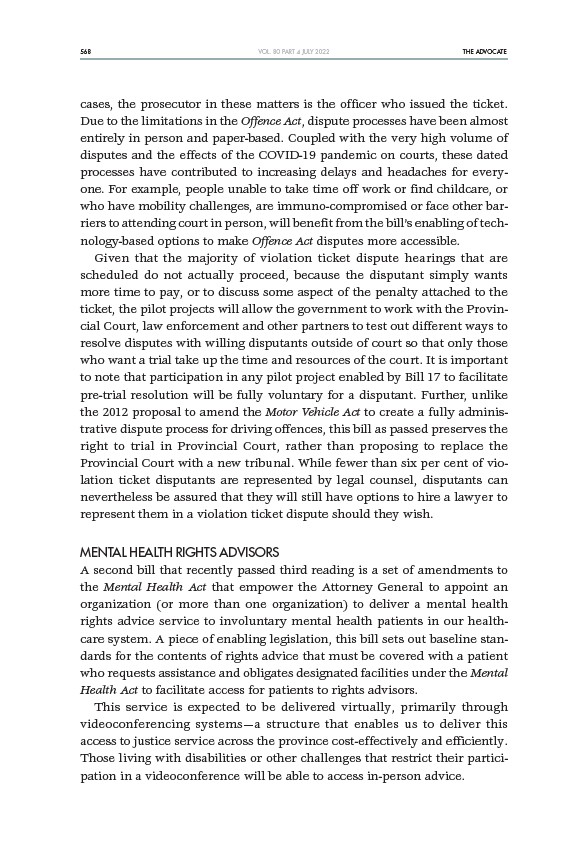
568 THE ADVOCATE
VOL. 80 PART 4 JULY 2022
cases, the prosecutor in these matters is the officer who issued the ticket.
Due to the limitations in the Offence Act, dispute processes have been almost
entirely in person and paper-based. Coupled with the very high volume of
disputes and the effects of the COVID-19 pandemic on courts, these dated
processes have contributed to increasing delays and headaches for everyone.
For example, people unable to take time off work or find childcare, or
who have mobility challenges, are immuno-compromised or face other barriers
to attending court in person, will benefit from the bill’s enabling of technology
based options to make Offence Act disputes more accessible.
Given that the majority of violation ticket dispute hearings that are
scheduled do not actually proceed, because the disputant simply wants
more time to pay, or to discuss some aspect of the penalty attached to the
ticket, the pilot projects will allow the government to work with the Provincial
Court, law enforcement and other partners to test out different ways to
resolve disputes with willing disputants outside of court so that only those
who want a trial take up the time and resources of the court. It is important
to note that participation in any pilot project enabled by Bill 17 to facilitate
pre-trial resolution will be fully voluntary for a disputant. Further, unlike
the 2012 proposal to amend the Motor Vehicle Act to create a fully administrative
dispute process for driving offences, this bill as passed preserves the
right to trial in Provincial Court, rather than proposing to replace the
Provincial Court with a new tribunal. While fewer than six per cent of violation
ticket disputants are represented by legal counsel, disputants can
nevertheless be assured that they will still have options to hire a lawyer to
represent them in a violation ticket dispute should they wish.
MENTAL HEALTH RIGHTS ADVISORS
A second bill that recently passed third reading is a set of amendments to
the Mental Health Act that empower the Attorney General to appoint an
organization (or more than one organization) to deliver a mental health
rights advice service to involuntary mental health patients in our healthcare
system. A piece of enabling legislation, this bill sets out baseline standards
for the contents of rights advice that must be covered with a patient
who requests assistance and obligates designated facilities under the Mental
Health Act to facilitate access for patients to rights advisors.
This service is expected to be delivered virtually, primarily through
videoconferencing systems—a structure that enables us to deliver this
access to justice service across the province cost-effectively and efficiently.
Those living with disabilities or other challenges that restrict their participation
in a videoconference will be able to access in-person advice.